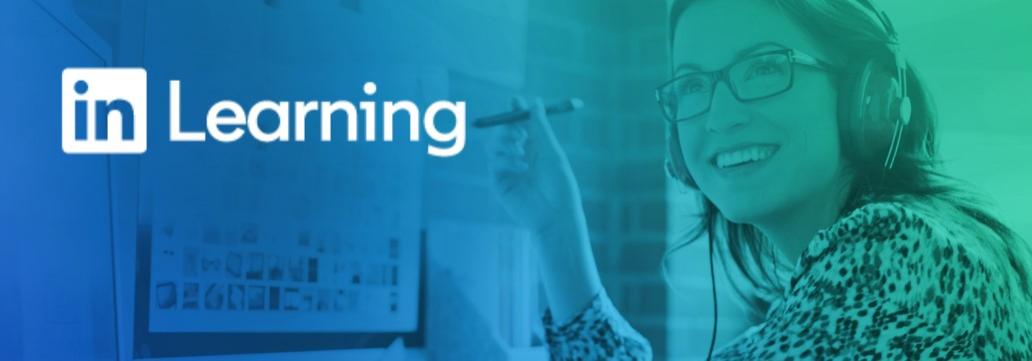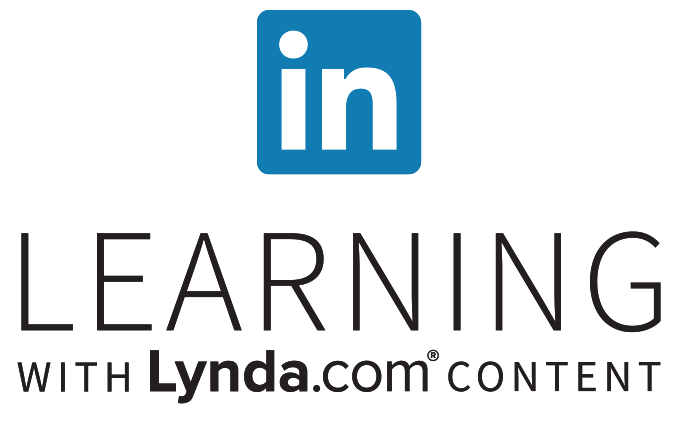
LinkedIn Higher Learning
 LinkedIn Learning is free--just activate your account using your Lincoln email and log in!
LinkedIn Learning is free--just activate your account using your Lincoln email and log in!
LinkedIn Learning is an online video platform that provides access to thousands of courses and tutorials taught by experts and industry leaders. All full-time faculty and staff have full member access to use LinkedIn Learning to learn a new subject or brush up on an existing skill.
With LinkedIn Learning, you get:
- Unlimited access. Choose from more than 5,000 video tutorials covering business, technology, software, and creative skills – from beginner to advanced. Software tutorials include products widely used at Lincoln University such as Microsoft Office and Adobe's suite of products.
- Expert instructors. Learn from industry leaders, all in one place. Convenient learning. Complete courses at your own pace, from any desktop or mobile device. Your progress is saved so you can pick up where you left off.
- Bite-size learning. All LinkedIn Learning courses are broken into short videos, so you can focus on a key topic of interest. Watching small snippets of longer courses helps you gain knowledge across numerous subjects. Helpful resources. Reinforce new knowledge with quizzes, exercise files, and coding practice windows.
Activation
Ready to start? Current employees will receive a LinkedIn Learning welcome email. As part of the on-boarding process for new full-time faculty or staff members, Human Resources will initiate the LinkedIn Learning welcome email. Full-time faculty or staff members who did not receive the welcome email may request activation.
Contact
The LinkedIn Learning initiative is a collaboration among the Office of Human Resources (HR), Center for Excellence in Teaching & Learning (CETL), and the Office of Information Technology (IT). For assistance, email support@lincoln.edu.
This professional development initiative aligns with the University’s Strategic Plan:
- Theme One: Build a Culture that Supports Student Success
- Objective 3: Design and deliver or procure training and professional development programs that support employees in developing skills which reflect institutional values and behavior (e.g. customer service, communication and collaboration, team building)
-
Training for Essential Skills
Verbal Communications
Non-Verbal Communications
Listening Effectively
Written Communication for Business
Time Management
Time Management Tips Weekly Time management Time Management: Working from Home Get your time management back on track Time Management for Managers Time management for managers and leaders Time Management Fundamentals Time management and planning Efficient Time Management Organization and time management 5 Ways to Control Your Time Helping others improve their time management Finding Your Time Management Style Time management for working in teams Managing Your Time Foundations of effective time management Improving Your Focus Adopting time-management tools The objective of time management How the course is structured to find your time management style What is a time management style? Find your time management style Helping others improve their time management Accountability
Enhancing Your Productivity Accountability and transparency Getting Things Done Accountability Overcoming Procrastination Accountability Achieving Your Goals Achieving accountability Improving Your Judgment Establishing accountability Building Accountability Into Your Culture Accepting accountability Fred Kofman on Accountability Understanding accountability Building Accountability Into Your Culture Fostering accountability Ensure invigorating accountability Managing accountability Reinforcing a culture of accountability Next steps: make accountability a way of life Embrace accountability Get help holding yourself accountable Balancing accountability and creativity Raise the stakes on accountability Creating a culture of accountability Collaboration
Working Remotely Collaboration checklist Managing Teams The fundamentals of collaboration New Manager Foundations Practice emotional intelligence Delegating Tasks to Your Team (2013) Using emotional intelligence to maximize success Leading Productive Meetings Collaboration and self-organized teams Building Your Technology Skills Collaboration and commitment Leading with Emotional Intelligence Collaboration culture Business Collaboration in the Modern Workplace Tips for increasing participation and collaboration Collaborative Design: Managing a Team Collaboration in the modern workplace Collaboration that works Collaboration and team innovation Create collaboration opportunities Choosing a collaboration model Distributed team collaboration Keeping collaboration in its place Communication
Decision Making and Critical Thinking
Networking
Strategic Thinking
-
Training for Employability Skills
Teamwork
Problem Solving
Self Management
Learning
Initiative and Enterprise
-
FAQs about Linkedin Learning
What is LinkedIn Learning?
LinkedIn Learning is an online video platform that provides access to thousands of courses and tutorials taught by experts and industry leaders. Full-time faculty and staff may use LinkedIn Learning to learn a new subject or brush up on an existing skill.
With LinkedIn Learning, you get:
- Unlimited access. Choose from more than 5,000 video tutorials covering business, technology, software, and creative skills – from beginner to advanced. Software tutorials include products widely used at Lincoln University such as Microsoft Office and Adobe's suite of products.
- Expert instructors. Learn from industry leaders, all in one place. Convenient learning. Complete courses at your own pace, from any desktop or mobile device. Your progress is saved so you can pick up where you left off.
- Bite-size learning. All LinkedIn Learning courses are broken into short videos, so you can focus on a key topic of interest. Watching small snippets of longer courses helps you gain knowledge across numerous subjects. Helpful resources. Reinforce new knowledge with quizzes, exercise files, and coding practice windows.
Is there a fee for employees to access LinkedIn Learning?
No. Lincoln University has partnered with LinkedIn Learning through a contractual agreement and this valuable on-demand learning opportunity is at no cost to you!
Who is eligible to access the LinkedIn Learning training?
Currently, only full-time faculty and staff members employed by Lincoln University are eligible. Students, adjuncts, and those who work for contracted companies are not eligible. A second rollout phase is planned to allow students access to LinkedIn Learning.
When will active Lincoln University students gain access to LinkedIn Learning’s resources?
The University is piloting LinkedIn Learning to full-time faculty and staff in the spring and summer of 2020 and will offer it to students in fall 2020.
Will I receive college credit?
No, these courses are for professional development and not credit-bearing.
Will Lincoln University have access to view my LinkedIn activity on my personal account?
Lincoln University’s HR and IT staff will have access to your learning activity. Lincoln University will not have access to any of your personal information on your LinkedIn account.
LinkedIn will not give your employer access to private activity from your personal LinkedIn account, such as:
- Your connections
- Your private messages
- Any job search activity, such as job posts you've viewed
- Any learning courses you've viewed in your personal account
How do I start?
As part of the on-boarding process as a new full-time faculty or staff member, Human Resources will initiate the LinkedIn Learning welcome email. For current employees, Human Resources has submitted a complete list of full-time faculty and staff to LinkedIn Learning.
I’ve started a course, but it’s not a good fit for what I needed. Can I stop taking it mid-course?
Yes.
Am I required to do any training? Will not doing training affect my annual review?
Whether training through LinkedIn Learning is required is a decision that is determined by your supervisor. You can be expected to complete training or learning courses if you and your supervisor have identified related performance management objectives as part of your annual performance review.
Will my supervisor know if I complete LinkedIn Learning training or learning courses?
No, only Human Resources and Information Technology have access to view all courses viewed or completed. You will be able to view and share your transcript when you log in.
Can I complete this training during my regular workday?
While meeting the operational needs of departments, supervisors and department chairs are encouraged to discuss with their direct reports job related on-demand learning modules that may be accessed during the workday.
Most employees really do want to learn and grow at work. Employees who feel appreciated and challenged through training opportunities may feel more satisfaction toward their jobs.
Can I use a mobile device to access LinkedIn Learning?
Check LinkedIn Learning's Systems Requirements to ensure LinkedIn Learning will be able to run on your device, then visit LinkedIn Learning's app site to download the app for your device.
To login via your mobile device: Open the app, tap Login, and then select the Organization tab. On the Organization tab, under the Web Portal section, type lincoln.edu in the field, and then tap the Log in button. Then enter your username and password to access LinkedIn Learning.What if I’m a new Lincoln full-time faculty or staff member, but already have a personal LinkedIn Learning account?
You may continue to use your personal LinkedIn Learning account separately from your Lincoln University account. When you activate your Lincoln University account, you will have the opportunity to transfer course history to your Lincoln account, but it is not recommended. This action cannot be reversed – you cannot transfer course history from your Lincoln account back into your personal account.
What happens to my LinkedIn Learning account if I leave Lincoln University?
Your Lincoln account will become inactive. We recommend you download or print any notes or certificates you want to keep before departing.